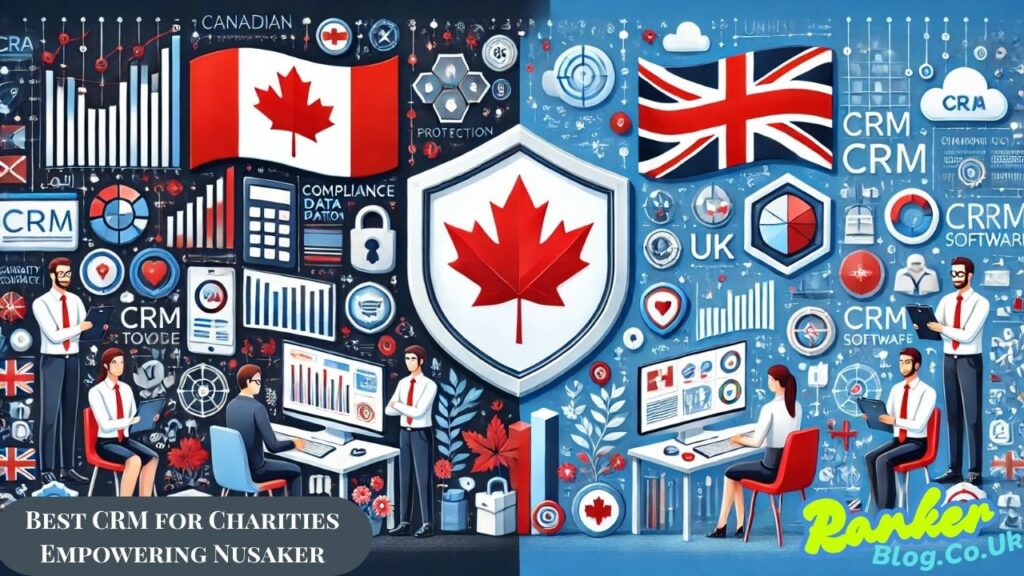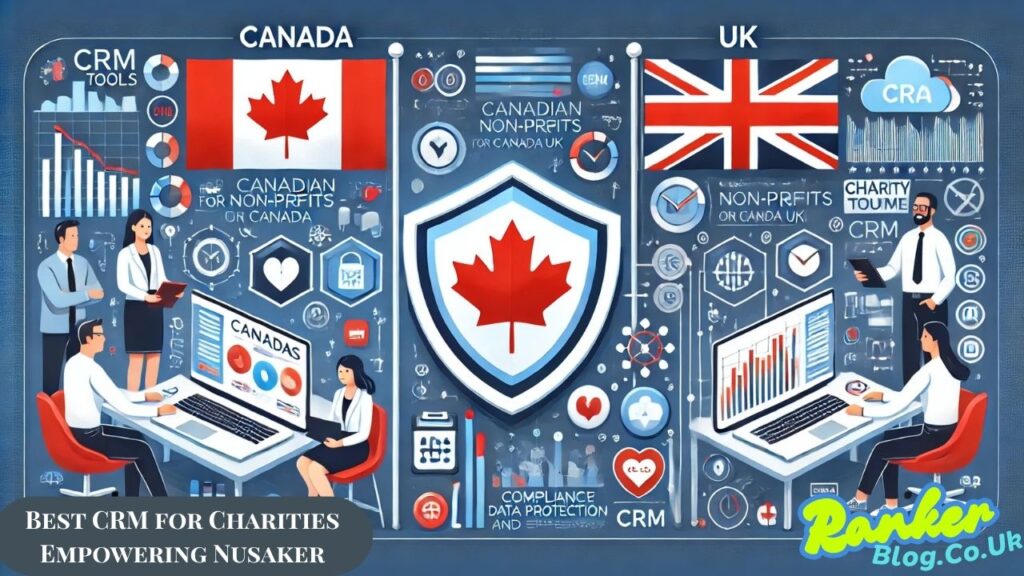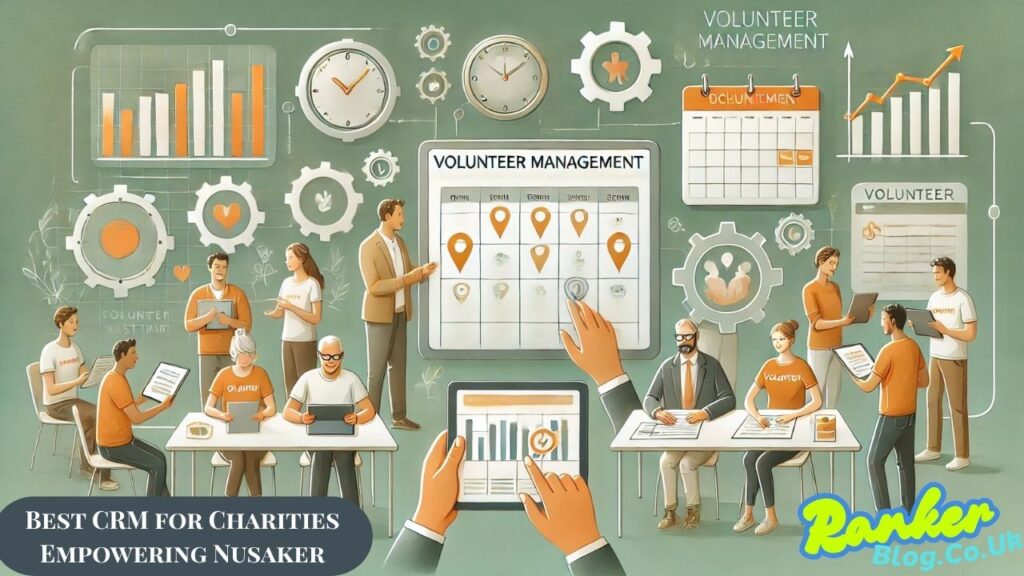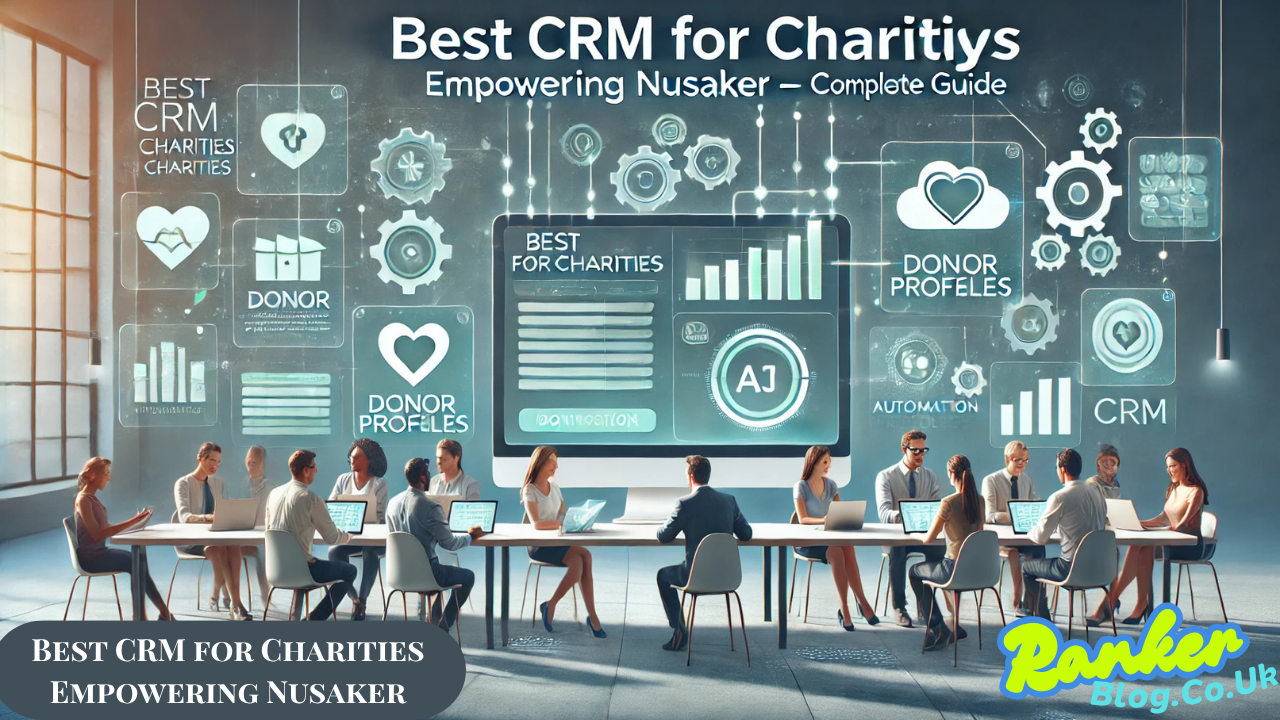Introduction
Non-profit organisations are continually seeking ways to enhance their impact, streamline operations, and increase donations. This is where Customer Relationship Management (CRM) comes in—a powerful tool that enables this transformation. The right CRM for charity can help businesses manage relationships with stakeholders, improve communication, and organize donor data efficiently. This game-changing solution automates the process, drives engagement, and enhances fundraising strategies. CRM for Charities Empowering Nusaker exemplifies how a local, forward-thinking non-profit transforms donor relationships, monitors contributors, and leverages technology to drive meaningful change.
Nusaker uses an AI-driven charity CRM solution that automates repetitive tasks, ultimately saving time and driving measurable outcomes. As a wide range of options are available, choosing the best CRM software for a non-profit organization requires strategic planning. If you are looking for a robust tool for your charity, this guide will explain how CRM for charities empowers Nusaker. Additionally, learn essential features to consider when choosing CRM tools for non-profits in the Canada and UK regions.
Understanding CRM for Non-profits
Customer Relationship Management systems have become essential infrastructure for modern charitable organizations. These platforms serve as centralized hubs where non-profits can track interactions, manage contributions, and nurture relationships with supporters over time.
A non-profit CRM differs significantly from commercial solutions. While business-focused platforms prioritize sales pipelines and revenue generation, charity-oriented systems emphasize donor stewardship, volunteer coordination, and grant tracking. The best CRM for charities empowering Nusaker demonstrates how specialized features address unique non-profit challenges.
Why Charities Need Dedicated CRM Solutions
Traditional spreadsheets and scattered databases create inefficiencies that drain valuable resources. Charitable organizations face distinct operational requirements that generic software cannot adequately address. Donor retention depends on personalized communication, timely acknowledgments, and transparent reporting—all of which require sophisticated data management.
CRM tools for non-profits consolidate information from multiple touchpoints, creating comprehensive supporter profiles. This holistic view enables organizations to understand giving patterns, identify major gift prospects, and craft targeted engagement strategies. For organizations like Nusaker, implementing the right system means transforming raw data into actionable insights that drive mission success.
How CRM for Charities Empowers Nusaker

Nusaker’s journey illustrates the transformative potential of purpose-built non-profit technology. Before implementing their current system, the organization struggled with fragmented donor records, manual data entry, and limited visibility into fundraising performance. These challenges prevented staff from focusing on meaningful relationship-building activities.
Streamlined Donor Management
The charity CRM solution adopted by Nusaker centralizes all supporter information in one accessible location. Staff members can instantly access donation history, communication preferences, and engagement levels without searching through multiple databases. This efficiency allows team members to spend more time cultivating relationships rather than hunting for information.
Automated data capture eliminates redundant entry work. When supporters make online contributions, attend events, or sign up for newsletters, their information automatically populates the system. This seamless integration ensures accuracy while reducing administrative burden.
Enhanced Communication Strategies
Effective outreach requires understanding each supporter’s journey and preferences. The CRM for charity implemented by Nusaker segments audiences based on giving levels, interests, and engagement history. This segmentation enables personalized messaging that resonates with different supporter groups.
Automated email campaigns deliver timely acknowledgments, impact updates, and renewal reminders without manual intervention. Staff can schedule communications in advance, ensuring consistent touchpoints throughout the year. This systematic approach strengthens relationships and improves retention rates.
Data-Driven Decision Making
Real-time dashboards provide leadership with instant visibility into organizational performance. Nusaker’s team monitors key metrics such as donation trends, campaign effectiveness, and supporter acquisition costs. These insights inform strategic planning and resource allocation decisions.
The AI-driven charity CRM solution analyzes patterns that humans might overlook. Predictive analytics identify supporters at risk of lapsing, enabling proactive retention efforts. The system also flags potential major donors based on engagement signals and giving capacity indicators.
Essential Features of the Best CRM Software for Non-profits

Selecting appropriate technology requires understanding which capabilities deliver the greatest value for charitable operations. The best CRM for charities empowering Nusaker includes several critical features that address nonprofit-specific needs.
Comprehensive Donor Tracking
Robust donor management functionality forms the foundation of any effective non-profit CRM. Systems should capture complete giving histories, including one-time gifts, recurring contributions, in-kind donations, and pledge commitments. This comprehensive tracking enables accurate reporting and informed stewardship decisions.
Contact records should accommodate multiple relationship types—donors, volunteers, board members, and beneficiaries—within a single database. Household management features link family members while maintaining individual giving records, which proves essential for accurate tax receipts and personalized communication.
Fundraising Campaign Management
Integrated campaign tools allow organizations to plan, execute, and measure fundraising initiatives from within their CRM. Staff can set goals, assign tasks, track progress, and analyze results without switching between multiple platforms. This unified approach improves coordination and accountability.
Multi-channel fundraising support accommodates diverse giving methods. Whether supporters contribute through online portals, direct mail, events, or peer-to-peer campaigns, the CRM for charity should capture and attribute donations correctly. Proper attribution ensures accurate ROI calculations and helps identify the most effective fundraising channels.
Volunteer Management Capabilities
Many charitable organizations rely heavily on volunteer support to fulfill their missions. CRM tools for non-profits should include features for recruiting, scheduling, and tracking volunteer activities. Staff can match volunteers with appropriate opportunities based on skills, interests, and availability.
Hour tracking and impact measurement demonstrate volunteer contributions in annual reports and grant applications. Recognition tools help organizations acknowledge dedicated volunteers, strengthening retention and encouraging continued engagement.
Grant Management Functions
Foundation and government grants often represent significant revenue sources for non-profits. The best CRM software for a non-profit organization includes grant tracking features that monitor deadlines, requirements, and reporting obligations. Centralized grant management prevents missed opportunities and ensures compliance with funder expectations.
Document storage capabilities keep proposals, agreements, and reports organized and easily accessible. Staff can quickly retrieve information needed for renewals or audits, saving time and reducing stress during critical periods.
Reporting and Analytics
Comprehensive reporting transforms raw data into meaningful insights. Non-profit CRM systems should offer pre-built reports for common needs—donation summaries, campaign performance, retention rates—along with customizable options for unique requirements. Visual dashboards make complex information easily digestible for board presentations and strategic planning sessions.
Advanced analytics identify trends, predict outcomes, and uncover opportunities. The charity CRM solution used by Nusaker leverages these capabilities to optimize fundraising strategies and improve operational efficiency.
Integration Capabilities That Matter

Modern non-profits use various specialized tools for email marketing, accounting, event management, and online fundraising. The best CRM for charities empowering Nusaker seamlessly integrates with these complementary platforms, creating a connected technology ecosystem.
Email Marketing Integration
Connecting the CRM for charity with email marketing platforms enables sophisticated communication strategies. Donor segments created in the database automatically sync with email tools, ensuring messages reach the right audiences. Engagement data flows back to the system, enriching supporter profiles with valuable behavioral information.
This bidirectional integration eliminates manual list uploads and reduces the risk of sending communications to incorrect recipients. Staff can track email performance alongside other engagement metrics, providing a complete picture of supporter interactions.
Accounting Software Connectivity
Financial accuracy requires tight integration between fundraising and accounting systems. When CRM tools for non-profits connect with accounting platforms, donation data transfers automatically, reducing manual entry and minimizing errors. This integration streamlines month-end closing processes and improves financial reporting accuracy.
Automated synchronization ensures that both systems reflect current information. Financial teams can reconcile contributions more efficiently, while fundraising staff maintain confidence that their data matches official records.
Online Donation Platform Links
Seamless connections with online giving platforms provide donors with convenient contribution options while maintaining data integrity. When supporters complete transactions through web-based forms, their information and gift details automatically populate the non-profit CRM. This real-time data flow enables immediate acknowledgment and eliminates batch import processes.
Integration also supports recurring gift management. The system automatically records scheduled payments, updates supporter records, and triggers appropriate communications throughout the giving cycle.
Top CRM Solutions for Charitable Organizations
Several platforms have established themselves as leaders in the non-profit technology space. Each offers distinct advantages depending on organizational size, budget, and specific requirements.
Salesforce Non-profit Cloud
This comprehensive platform provides extensive functionality and customization options. Large organizations with technical resources often choose this solution for its scalability and robust feature set. The system supports complex organizational structures and sophisticated fundraising operations.
However, implementation requires significant time and expertise. Smaller charities may find the learning curve challenging and the cost structure prohibitive. Organizations considering this option should carefully evaluate whether they can fully utilize the available capabilities.
Bloomerang
Designed specifically for donor retention, Bloomerang emphasizes relationship-building over transactional processing. The intuitive interface requires minimal training, making it accessible for small teams without dedicated IT support. Built-in retention tools help organizations identify at-risk supporters and take proactive retention measures.
Customization options are more limited compared to enterprise platforms. Organizations with highly specialized requirements may find the platform somewhat restrictive. Nevertheless, for many small to mid-sized charities, Bloomerang offers an excellent balance of functionality and usability.
Little Green Light
Budget-conscious organizations appreciate this affordable solution that delivers solid core functionality. The platform handles essential donor management, fundraising tracking, and reporting needs without overwhelming users with unnecessary complexity.
Advanced features found in premium platforms are generally absent. Organizations anticipating rapid growth or requiring sophisticated automation may outgrow the system. For resource-constrained charities focused on fundamental CRM capabilities, Little Green Light represents a practical choice.
NeonCRM
This all-in-one platform combines donor management, event registration, membership tracking, and website integration. Organizations managing multiple program types benefit from having everything in one system. The unified approach simplifies data management and improves operational efficiency.
Pricing can become significant for very small organizations. However, consolidating multiple tools into a single platform often reduces overall technology costs while improving data consistency.
CRM Implementation Best Practices
Successfully deploying new technology requires careful planning and change management. Organizations that rush implementation often encounter avoidable problems that undermine adoption and ROI.
Conducting Thorough Needs Assessment
Before evaluating specific platforms, charitable organizations should document current processes, pain points, and desired outcomes. This assessment creates a foundation for comparing solutions and ensuring selected systems address actual needs rather than perceived wants.
Involving stakeholders from across the organization ensures the assessment captures diverse perspectives. Fundraisers, program staff, finance teams, and leadership all interact with supporter data differently. Understanding these varied use cases helps identify requirements that might otherwise be overlooked.
Data Cleanup and Migration Planning
Most non-profits have accumulated years of supporter information across multiple systems and formats. Before migrating to a new CRM for charity, organizations should dedicate time to cleaning and standardizing this data. Removing duplicates, correcting errors, and filling gaps improves data quality and sets the foundation for effective use.
Migration planning should prioritize historical information based on value and effort required. Complete donation histories typically warrant migration, while outdated event registrations may not. Establishing clear criteria helps teams focus on transferring the most important information.
Comprehensive Staff Training
Even the most intuitive CRM tools for non-profits require training for effective use. Organizations should develop training programs that address different user roles and skill levels. Fundraisers need different knowledge than program staff or executives reviewing dashboards.
Ongoing education ensures staff stay current as platforms evolve and organizational needs change. Regular refresher sessions, documentation resources, and designated power users support continuous learning and adoption.
Phased Rollout Strategy
Rather than activating all features simultaneously, successful implementations follow phased approaches. Starting with core functionality allows staff to build confidence and competence before adding complexity. This gradual expansion reduces overwhelm and increases the likelihood of successful adoption.
Early wins build momentum and demonstrate value to skeptical team members. Organizations should identify quick wins—processes that new systems dramatically improve—and prioritize those during initial phases.
Regional Considerations for Canada and UK Non-profits
Organizations operating in Canada and UK face specific regulatory requirements and cultural expectations that influence technology decisions.
Privacy and Data Protection Compliance
Canadian charities must comply with privacy legislation governing how organizations collect, use, and protect personal information. The best CRM software for a non-profit organization should include features supporting compliance, such as consent tracking, data retention controls, and audit trails.
UK organizations navigate GDPR requirements, which impose strict standards for data processing and supporter rights. Systems must facilitate access requests, support right-to-be-forgotten provisions, and maintain detailed processing records. Non-profits should verify that potential CRM solutions accommodate these regulatory obligations.
Tax Receipt Requirements
Different jurisdictions have specific requirements for charitable tax receipts. Canadian organizations must issue receipts meeting Canada Revenue Agency standards, including specific information and formatting requirements. The charity CRM solution should automate compliant receipt generation, reducing administrative burden and ensuring accuracy.
UK charities participating in Gift Aid schemes need systems that track and report eligible donations. Automated Gift Aid processing capabilities save significant time while maximizing revenue recovery from tax reclaim programs.
Currency and Language Support
Organizations serving multilingual communities or operating across borders require systems supporting multiple languages and currencies. The CRM for charities empowering Nusaker demonstrates how appropriate localization features improve donor experience and operational efficiency.
Multicurrency support proves essential for international fundraising efforts. Systems should handle conversions, track donations in original currencies, and report in preferred denominations without creating reconciliation headaches.
Measuring CRM Success and ROI
Implementing new technology represents a significant investment of time and resources. Organizations need frameworks for evaluating whether their chosen systems deliver expected benefits.
Key Performance Indicators
Tracking specific metrics helps non-profits assess CRM impact objectively. Donor retention rates indicate whether improved relationship management translates into sustained support. Increases in average gift size suggest more effective major gift identification and cultivation.
Administrative efficiency metrics reveal time savings from automation. If staff spend fewer hours on data entry and report generation, they have more capacity for relationship-building activities that directly advance organizational missions.
Fundraising Effectiveness
Campaign performance comparisons demonstrate how CRM tools for non-profits improve fundraising outcomes. Organizations should track response rates, average gifts, and total revenue for campaigns before and after implementation. Improved targeting and personalization typically yield measurable improvements.
Donor acquisition costs and lifetime value calculations provide insight into long-term fundraising sustainability. The best CRM for charities empowering Nusaker enables sophisticated analysis of these critical metrics, informing strategic decisions about resource allocation.
User Adoption Rates
Technology only delivers value when people actually use it. Monitoring login frequency, feature utilization, and data quality provides insight into adoption levels. Low usage may indicate training gaps, workflow mismatches, or change management challenges requiring attention.
Regular user feedback helps organizations understand obstacles and opportunities. Staff members closest to daily operations often identify practical improvements that enhance efficiency and adoption.
Future Trends in Non-profit CRM Technology
The charity CRM solution landscape continues evolving as new capabilities emerge and donor expectations shift.
Artificial Intelligence and Machine Learning
AI-driven charity CRM solution platforms increasingly incorporate machine learning for predictive analytics and automation. These technologies identify patterns, forecast outcomes, and recommend actions that enhance fundraising effectiveness. As costs decrease and accessibility improves, more organizations will leverage AI capabilities.
Natural language processing may revolutionize how non-profits interact with supporters. Chatbots could handle routine inquiries, freeing staff for complex conversations requiring human judgment and empathy.
Mobile-First Design
Smartphones have become primary devices for many supporters. Modern CRM tools for non-profits prioritize mobile experiences, ensuring staff can access information and complete tasks from anywhere. Mobile-optimized donor interfaces simplify giving, improving conversion rates and supporter satisfaction.
Field staff conducting community outreach benefit tremendously from mobile CRM access. Real-time data updates ensure everyone works from current information regardless of location.
Enhanced Integration Ecosystems
The best CRM software for a non-profit organization will offer increasingly sophisticated integration capabilities. As non-profits adopt specialized tools for marketing automation, social media management, and peer-to-peer fundraising, seamless data flow between platforms becomes critical.
Open APIs and pre-built connectors will reduce integration costs and complexity, making connected technology ecosystems accessible to organizations of all sizes.
Conclusion
Choosing and implementing the right CRM for charity represents one of the most impactful decisions non-profit leaders make. As demonstrated by how CRM for charities empowers Nusaker, appropriate technology transforms operations, strengthens relationships, and accelerates mission achievement.
Organizations should approach CRM selection methodically, prioritizing features that address their specific challenges and opportunities. The best CRM for charities empowering Nusaker works because it aligns with organizational workflows, integrates with existing tools, and provides capabilities staff actually need.
Whether operating in Canada, UK, or elsewhere, charitable organizations benefit from systems designed specifically for non-profit requirements. Donor management, fundraising tracking, volunteer coordination, and grant monitoring require specialized features that general business CRM platforms lack.
Success depends not just on technology selection but on thoughtful implementation, comprehensive training, and ongoing optimization. Organizations that invest in proper planning, data preparation, and change management realize substantially greater returns than those rushing deployment.
The non-profit technology landscape offers diverse options at various price points. Small charities can access affordable solutions delivering core functionality, while larger organizations requiring advanced capabilities have robust platforms available. The key lies in matching organizational needs, resources, and growth plans with appropriate technology investments.
As artificial intelligence, mobile technology, and integration capabilities continue advancing, CRM tools for non-profits will become even more powerful and accessible. Forward-thinking organizations that embrace these innovations will build stronger donor relationships, operate more efficiently, and create greater impact in their communities.
Also Read: Common Array Manager A Comprehensive Guide to Array Management Solutions

